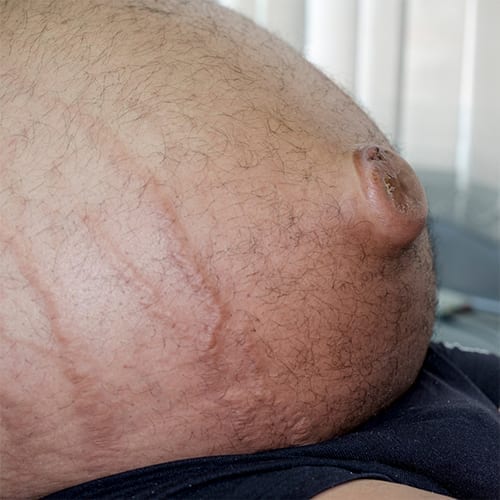Ascites
What is ascites?

Ascites is the fluid buildup in the abdomen and lower extremities caused by liver disease. The fluid builds up between the layers of tissue that cover the abdominal organs.
Symptoms and Causes
People with liver disease may experience different amounts of fluid buildup. This fluid buildup is caused by increased pressure called portal hypertension. A small buildup of fluid may not cause any symptoms, but as the amount of fluid increases, it can cause waist size expansion and weight gain. When large amounts of fluid gather in the belly, it can lead to swelling and pain. The belly becomes hard from the fluid, and the belly button can become pushed out. Some people with ascites may develop swollen legs and ankles, called edema. Ascites can become infected, which is called spontaneous bacterial peritonitis. This infection needs to be treated early with the right antibiotics. If left untreated, the infection can be fatal. This infection can also greatly affect the functioning of your kidneys. Someone with spontaneous bacterial peritonitis will usually feel even more uncomfortable and experience tenderness in their abdomen and may develop a fever.
Diagnosis and Tests

Ascites can be diagnosed with a physical exam during which the doctor presses on the abdomen to detect the fluid. Some blood tests and kidney function tests may also confirm the ascites diagnosis.
Management and Treatment
Treatment options will include reducing the fluid buildup and preventing future occurrences. A low-sodium diet, medications called diuretics, which help to remove the fluid, or surgery to reroute blood flow may also be used. Reducing sodium or salt is a first-line therapy for ascites. If you have ascites, be sure to learn more from a nutritionist who specializes in the liver about your unique needs.
Medications called diuretics may be prescribed, which make the kidneys excrete more sodium and water into your urine, causing you to urinate more frequently. Sometimes, diuretics are not enough, and the fluid will continue to build up. When this happens, someone may have a procedure called therapeutic paracentesis. During paracentesis, a doctor uses ultrasound to guide a needle into the abdomen and drain the fluid out of the body. The fluid will often build back up, and the procedure will need to be repeated. If someone continues to have fluid buildup or other treatments do not work, a doctor may consider a TIPS procedure (transjugular intrahepatic portosystemic shunt). During a TIPS procedure, a new pathway is made to connect the portal vein, or one of its branches, with a vein in the general circulation, bypassing the liver. While this shunt placement can improve ascites, it can also cause a worsening of hepatic encephalopathy or confusion because of the liver disease.
Prevention
It is difficult to prevent ascites for a person with advanced stage cirrhosis as it is a part of the disease. However, by following a very healthy and nutritious diet, including limiting sodium intake, it may be lessened.
The TIPS procedure is another way to address the fluid buildup if the patient is a candidate for the procedure.
Outlook and Prognosis
Because ascites is a condition caused by advanced cirrhosis, it will impact your quality of life. Like the cirrhosis itself, lifestyle modifications including diet are part of the ongoing treatment. A discussion regarding a liver transplant should take place as it offers a future potentially free of liver disease.
Living With
Life with ascites may include frequent visits to your physician to monitor your condition and, when necessary, perform paracentesis. This is the procedure to physically drain the fluid. This will relieve the pressure and discomfort of carrying the fluid in the body. Because there’s no way to manage or predict when and how much fluid will build up, paracentesis may need to be performed frequently.
Clinical Trials
Clinical trials are research studies that test how well new medical approaches work in people. Before an experimental treatment can be tested on human subjects in a clinical trial, it must have shown benefit in laboratory testing or animal research studies. The most promising treatments are then moved into clinical trials, with the goal of identifying new ways to safely and effectively prevent, screen for, diagnose, or treat a disease.
Speak with your doctor about the ongoing progress and results of these trials to get the most up-to date information on new treatments. Participating in a clinical trial is a great way to contribute to curing, preventing and treating liver disease and its complications.
Additional Clinical Trials
Start your search here to find additional clinical trials that are looking for participants.
The American Liver Foundation receives contributions and funding from clinical trial and study sponsors but does not evaluate or endorse any clinical trials or studies, and is not affiliated with any of the sponsors.
Medically reviewed 6/2025
Last updated on July 25th, 2025 at 09:18 am